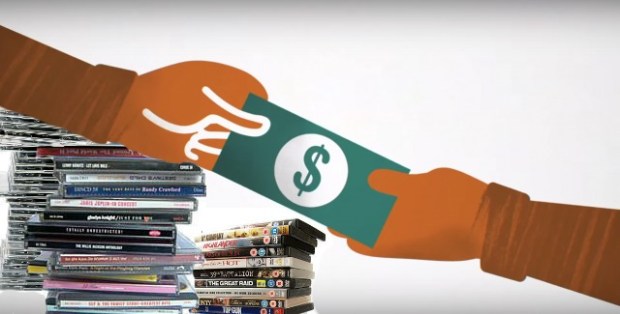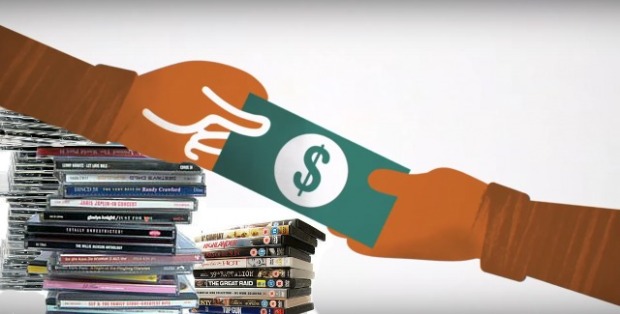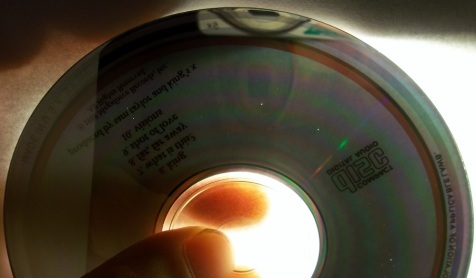GETTING MORE TALE #507: Buying School
One of my (many, many) jobs at the Record Store was running our “buying classes”.
The problem was this: teaching new employees how to buy used CDs was a very intensive process. It made sense for us to train multiple people at once in one session. We wouldn’t even try to teach an employee how to buy until they’d been with us for two months. Once they had a little bit of experience under their belts, we’d start training them on being a buyer. One of the best features of the stores was that everybody was a buyer. You didn’t have to wait for a specific person. Anyone behind the counter could buy. We had to make sure that every single person was 1) fair, 2) competent, and 3) ready for the responsibility.
The first two buying classes were done with two instructors – myself and one of the bosses. (The first one was memorable — one guy came in with a cocaine hangover after spending the night partying too hard with the Dandy Warhols.) Subsequently, I handled the classes solo. We would generally have three to four new employees in each class, all from different stores.
We had a dedicated computer just for these classes, and of course it was an old outdated one. We couldn’t afford to buy a computer just for these training classes, obviously. Do you remember how huge an old computer was? I’d check in early and begin setting up the monstrous hardware which consisted of a PC, a titanic heavy monitor, keyboard, mouse and receipt printer. Or, if the class was being held in another city, I’d pick up the equipment at our home office and drive it (and sometimes employees too) to the class. If I was lucky, about two months later I’d see a mileage cheque.
We also had several large boxes of “training CDs” to help with learning scenarios.
For example:
- CDs that were scratched, but repairable.
- Discs that were top-scratched or pinholed, and not repairable.
- CDs that were in mint condition.
- CDs that were missing a component, such as a back cover, or one of multiple discs.
- CDs that were so common that we always had them in stock.
- Box sets.
- Promo discs.
- Classical music (we used a different buying structure for classical albums, based more on record label and series than artist and title).
- Discs from every section of the store.
- DVDs and video games too.
There was a lot to teach, and I tried to make it fun, even though much of it was very tedious. A lot of repeat, a lot of doing the same thing over again, and a lot of waiting around as people took their turns going through buying scenarios. The classes were a chance for me to unbutton a bit and step out of the box. I had fun with the scenarios. I would play different characters. The white trash dude who watches everything you do and won’t shut up and let you think. The crackhead looking for a their next rock. The down-on-my-luck guy with a sob story that may or may not be true, who just needs enough money for the bus. And of course regular, every day, normal polite people. Because those are the exact situations they were going to experience in the front lines of the Record Store.
Not to mention (and we’ve been through this in more detail before, in Part 92: Staffing) there are many different versions of CDs. They can be similar, but have different tracks. It was crucially important to buy and enter these things accurately. If you didn’t, a customer would say, “I was looking on the internet and I saw you had the 1995 remastered version of Diary of a Madman,” and find that you just entered it wrong. It’s not the 1995; it’s the remixed 2002 one that nobody wants! Somebody made a trip in to get that CD, and you fucked it up. We tried to avoid that! But there’s only so much you can teach.
Then, to finish the buying procedures, I had to teach them about the bi-laws regarding buying used goods in the province, and how to take ID from customers. They had to know what ID’s were accepted, how to properly enter the info into the computer, and also how to deal with difficult customers who didn’t want to show their ID at all.
It was actually a pretty good system. Whoever came up with it (probably the same higher-up that sat in the first two classes) did a good job setting it up. Giving credit where credit is due, it worked. But also giving credit where credit is due, I worked my ass off in these classes, and made them my thing, while it lasted.
Training can be made fun. I think playing out scenarios is a great way to learn. Let’s face it, there is a lot of pressure on new employees during training. Doing my best to make it fresh and enjoyable was my strategy, and I think the results speak for themselves. A few people I trained ended up lasting over a decade, and that’s something to be proud of.




I heard somewhere it was illegal to ask for ID? ;)
I like the sound of your lessons Mike, if it’s fun, they’ll remember it!
LikeLiked by 1 person
No no, it’s illegal to ask someone their age. Apparently. Lol!
I tried to make it fun and memorable and I think I did.
LikeLiked by 1 person
Oh I bet the people you trained ran into those characters you portrayed – when the inevitable talkative guy came in, I bet the employee thought, hey, it’s the guy from buying training!
LikeLiked by 1 person
Awesome. Lebrain The Teacher. I can dig it. I wonder if I had got the job if you’d have had to teach me… hahaha that would have been great.
Last time I was in there, and trust me I don’t get in too often (I’m two hours from any of their shoppes) the kids behind the counter were pleasant enough and seemed to know what they were doing. Maybe they’re still using your example! ;)
LikeLike
You did very well, I would have liked to do the class myself. As a qualified teacher, I know how hard it can be so full kudos to you.
LikeLike
“No, I am sovereign, I don’t have to show you ID….am I being detained?” lol
LikeLiked by 1 person
Hahaha I remember that guy. Yeah, the judge didn’t care that he was sovereign and gave him a fine :)
LikeLiked by 1 person